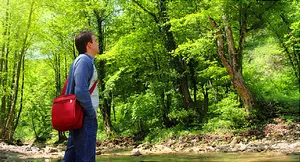
And yes, he literally writes a prescription for patients to go to a park. "The prescriptions that we do for parks are very flexible," he says. He asks his patients what they like to do. "The activity can be anything. It can be having a picnic outside, or a forest therapy session,'' says Zarr, who is a pediatrician at Unity Health Care and is training to become a certified forest therapy guide.
Research is accumulating on the healthful effects of contact with nature -- even very brief encounters. Among the findings:
1. As little as 20 minutes in a park boosted feelings of well-being, say researchers who surveyed 94 adults before and after visiting an urban park. The participants wore fitness trackers and completed a questionnaire before and after the visit.
2. Walking 15 minutes in a bamboo forest improved mood more in 60 adults than when they walked the same time period in a city area, other researchers report. Attention scores were better after the forest walk, too.
3. Forest bathing tends to lower cortisol levels, a marker of stress, better than taking part in other activities, a review of 30 studies found.
4. Forest therapy appears to lower depression levels in adults, according to a review of 28 studies.
5. Forest bathing also is found to boost the activity of natural killer cells, which help fight off infections and cancer.
6. The aromatic substances produced by plants and trees have been linked with lower inflammation and brain protection benefits.
What Forest Bathers Say
A coyote’s call from the guides brings the arboretum participants together again. This time, they gather in the Coach Barn, built in 1879 and still housing carriages from that era. Participants sit cross-legged on the wooden floor, and the guides pass tiny cups of rosemary tea, inviting all to sip and share their thoughts, if they wish.
Shay Sayani, 39, a Northridge, CA, holistic educator, says this is her third forest bathing experience. Now, she says, ''this is part of my self-care practice."
For Leon Adams, 68, a Glendale, CA, classical pianist, it was a first. "A friend recommended it," he says. "It took me a while to relax," he admits, but then he saw the rewards. "You leave the ‘monkey mind’ behind. You get into spaces in the mind that you can't get into when you are on the cellphone or in traffic."
On the walk back to the arboretum entrance, Kuang says she has introduced her 22-year-old son Chris to forest therapy. "He has autism and limited verbal expressions," she says. Forest walks ease his anxiety and improve his mood quickly. Her goal is to take him at least once a month. When he was asked by family to tell something that made him feel happy during the week, she says, he smiled and said ''forest walk."
What Is Cortisol?
Think of cortisol as nature’s built-in alarm system. It’s your body’s main stress hormone. It works with certain parts of your brain to control your mood, motivation, and fear.
Your adrenal glands -- triangle-shaped organs at the top of your kidneys -- make cortisol.
It’s best known for helping fuel your body’s “fight-or-flight” instinct in a crisis, but cortisol plays an important role in a number of things your body does. For example, it:
1. Manages how your body uses carbohydrates, fats, and proteins
2. Keeps inflammation down
3. Regulates your blood pressure
4. Increases your blood sugar (glucose)
5. Controls your sleep/wake cycle
6. Boosts energy so you can handle stress and restores balance afterward
How Does It Work?
Your hypothalamus and pituitary gland -- both located in your brain -- can sense if your blood contains the right level of cortisol. If the level is too low, your brain adjusts the amount of hormones it makes. Your adrenal glands pick up on these signals. Then, they fine-tune the amount of cortisol they release.
Cortisol receptors -- which are in most cells in your body -- receive and use the hormone in different ways. Your needs will differ from day to day. For instance, when your body is on high alert, cortisol can alter or shut down functions that get in the way. These might include your digestive or reproductive systems, your immune system, or even your growth processes.
Depression: Do You Know the Symptoms?
They include feeling several of the following for at least 2 weeks:
Feeling sad, anxious, or empty
Feeling hopeless or pessimistic
Feeling guilty, worthless, or helpless
Not enjoying things you used to enjoy
Trouble with concentration, memory, or making decisions
Sleeping too much or too little
Appetite changes
Gaining or losing weight
Feeling restless or irritable
Thoughts of suicide or death
'Forest Bathing' May Bust Your Stress
A moment to connect with Mother Nature may be the palate cleanse you need to help ease anxiety and stress.
No comments:
Post a Comment